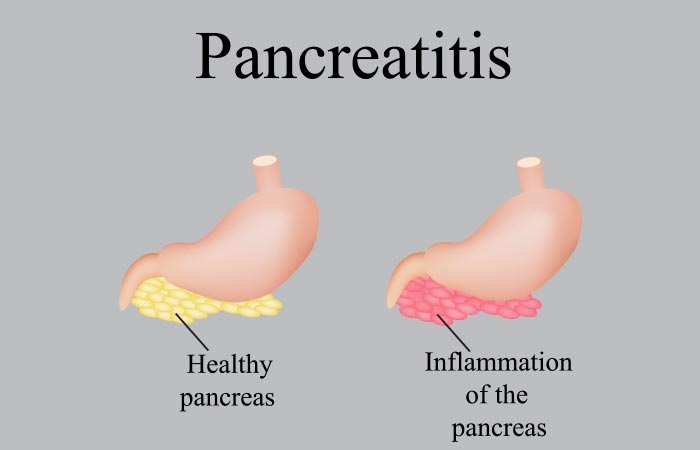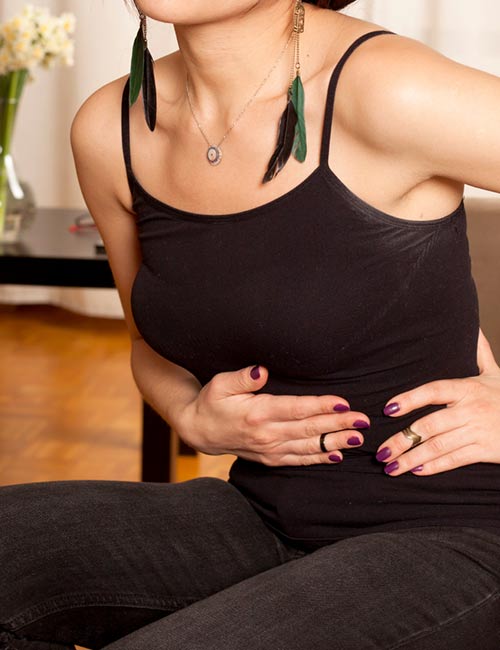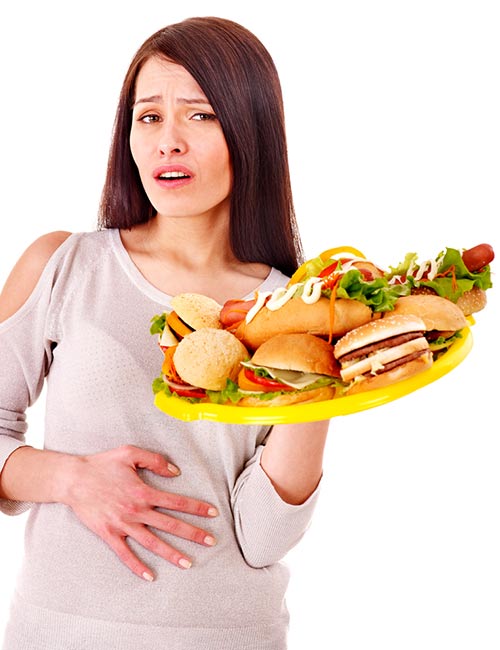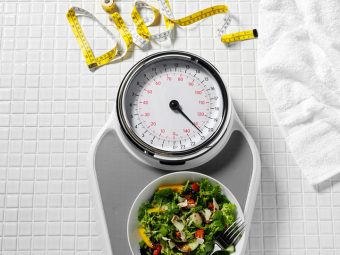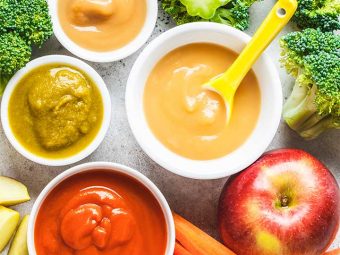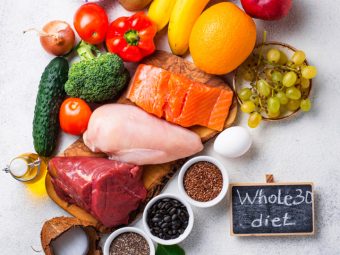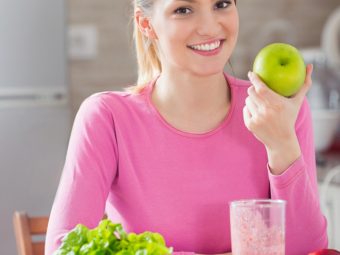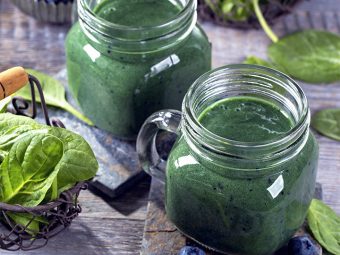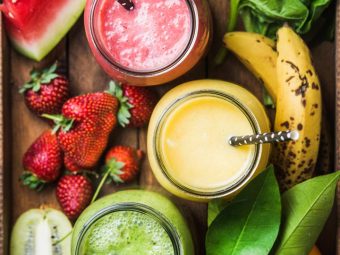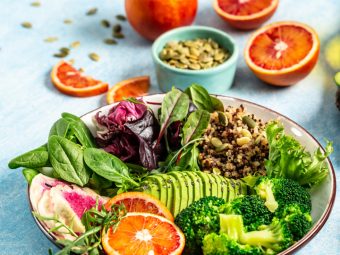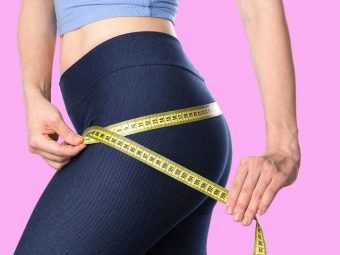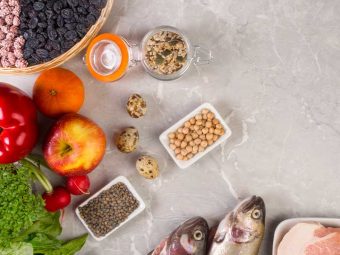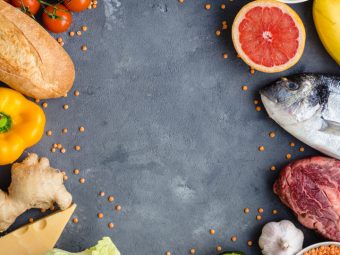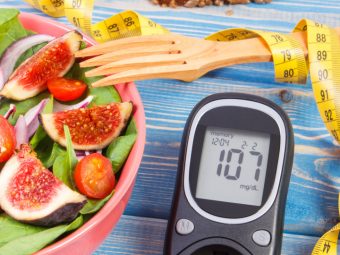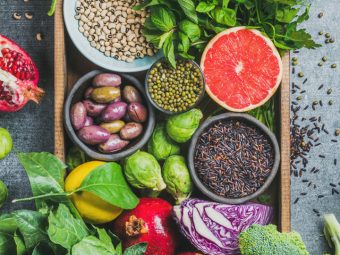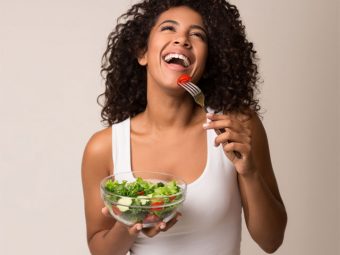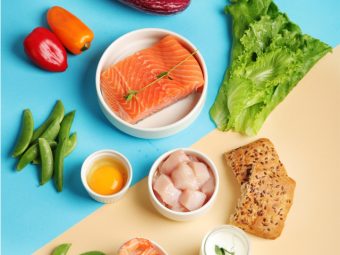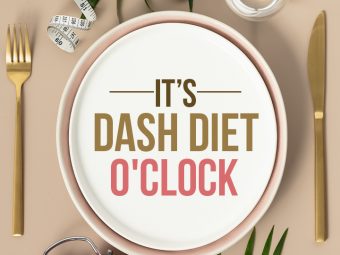Pancreatitis Diet – A Complete Recovery Diet Chart To Follow
Soothe the excruciating pain and bounce back to health with this diet.
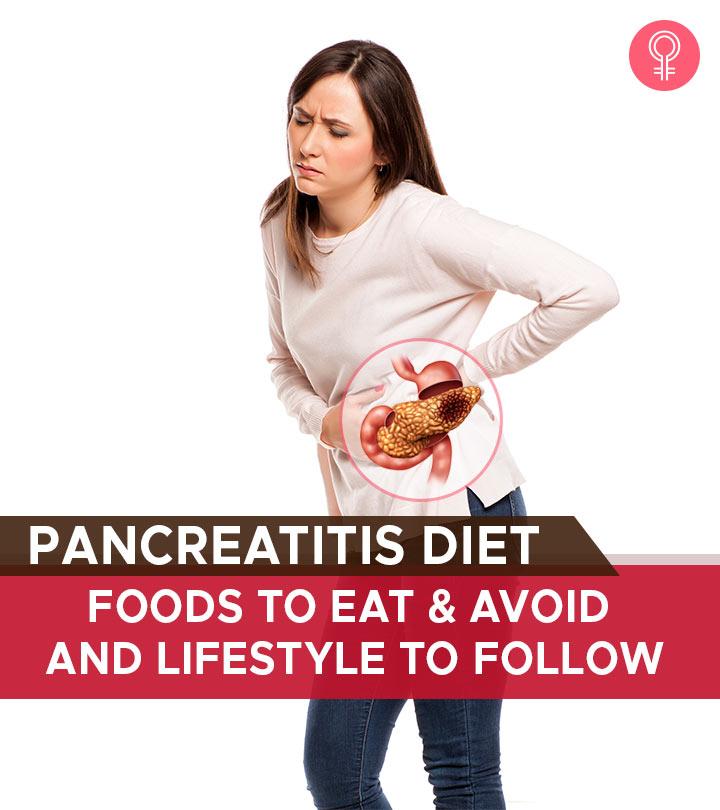
A pancreatitis diet is perfect for someone who experiences pancreatitis. More than 100,000 people have pancreatitis worldwide (1). Depending on the severity, pancreatitis can be chronic or acute. A pancreatitis-friendly diet is ideal for preventing complications like kidney issues, high blood sugar levels, and recurring acute pancreatitis and speeding up the healing (2). Read on to know all about the pancreatitis nutrition & diet, foods to eat and avoid, a diet plan, and lifestyle changes you must focus on. But first, know what’s pancreatitis after all. Scroll down!
 At A Glance: Pancreatitis Diet
At A Glance: Pancreatitis Diet- Principle: Focuses on limiting the intake of fatty foods and including nutrient-dense, high-protein foods.
- Purpose: To alleviate pancreatic inflammation and manage inflammation and related symptoms
- Who It Is For: Individuals with pancreatitis
- Duration: Short-term
- Caution: Consume easy-to-digest, boiled, or mashed food. Avoid high amounts of fiber, carbs, fats, sodium, sugar, and any foods that may irritate the digestive system.
In This Article
What Causes Pancreatitis?
Pancreatitis is caused due to inflammation of the pancreas, which is usually very painful and may need surgery (3). Pancreas, the elongated gland, is present in the visceral cavity and is almost covered by the stomach and duodenumi XThe first part of the small intestine that connects the stomach and the middle portion of the small intestine. . The main function of the pancreas is to secrete pancreatic enzymes and hormones. It secretes insulin and glucagon, hormones that help regulate blood sugar levels, and digestive enzymes like trypsin, amylase, and lipase that break down and metabolize proteins, carbs, and fats (4).
Usually, pancreatic enzymes are secreted in the upper part of the small intestine where the main breakdown of foods and absorption of nutrients occurs (5). But due to gallstonesi XThey are solid matter often in the shape of pebble-like pieces that form in the gallbladder and cause sharp pain. , excess alcohol, smoking, autoimmune diseasei XA disease wherein the body attacks its own immunity cells by mistake, not knowing which is a healthy cell and which is foreign. , or faulty genes, the pancreatic enzymes are secreted in the pancreas itself instead of the small intestine. And this leads to inflammation and inability to digest and absorb food.
There are many factors that can cause pancreatitis. One such cause is celiac disease which is basically an immune reaction to gluten that causes inflammation. The graph below represents the relationship between celiac disease and pancreatitis and shows that the occurrence of celiac disease increases the chances of pancreatitis.
% Prevalance Of Pancreatitis In People With Celiac & Non-celiac Disease
Source: The Risk of Acute and Chronic Pancreatitis in Celiac DiseasePancreatitis is of two types – acute and chronic. Scroll down to find the difference between the two.
What Is The Difference Between Acute And Chronic Pancreatitis?
Here are the main differences between acute and chronic pancreatitis:
Acute pancreatitis involves active inflammation of the pancreas, causing sudden bouts of abdominal pain and an increase in the level of blood enzymes. The pain may increase after a meal and occurs in the upper middle or left part of the abdomen. In some cases, it may last for days. Severe cases of acute pancreatitis may need surgery.
Chronic pancreatitis is a condition in which the pain is not as severe as acute pancreatitis, but it causes damage to the pancreas by calcificationi XIt is the build-up of calcium/calcium salts in body tissue and can cause the tissue to harden. It can happen in any area of the body. , ductal inflammationi XA type of inflammation within the breast in the milk ducts which causes pain, tenderness, and redness. , and fibrosisi XIt refers to the development of fibrous tissues caused by dust or by being exposed to allergens in the air. . And that’s bad news. Because it means that the pancreas has stopped working, and you may be prone to diabetes, liver problems, anemia, and malnutrition.
Now, let’s check out the symptoms of acute and chronic pancreatitis.
Acute Pancreatitis Symptoms
Around 30 out of 100,000 people suffer from acute pancreatitis (6). And the symptoms are usually as follows:
- Upper abdominal pain that may come and go or persist
- Fever
- Inability to digest food
- Nausea
- Pain right after meals
- Vomiting
- Tender abdomen
- Higher heart rate
- Back and shoulder pain
Chronic Pancreatitis Symptoms
Around 5-12 out of 100,000 people develop chronic pancreatitis (7). Not being on a pancreatitis diet, even after being diagnosed with acute pancreatitis, leads to it. And here are the symptoms of chronic pancreatitis:
- Drastic weight loss
- Steatorrhea – fatty stool with foul smell
- Difficulty in breathing
- Fatigue
- Dehydration
- Diarrhea
- Nausea
- Vomiting
- In some cases, the pain may reduce, indicating that the pancreas is ceasing to work.
Remember, you might experience abdominal pain due to various reasons. Do not panic. Call for help, and seek immediate medical attention.
To reduce the chances of recurrence of bouts of pancreatitis pain, you must take care of what you eat. Here are a few guidelines for your pancreatitis diet. Take a look.
Pancreatitis Diet Guidelines
Here are a few acute and chronic pancreatitis diet guidelines, which may aid in pancreatitis management:
- Focus on consuming healthy food, always.
- Be on a low-fat diet to prevent aggravating the inflammation.
- Stop drinking alcohol and smoking.
- Consume MCTs (medium-chain triglycerides) as these do not require pancreatic enzymes to be digested.
- Consult your doctor and get digestive enzyme supplements.
- Consult your doctor and take supplements for vitamins A, E, D, K, and B12.
- Consult your doctor and take minerals like calcium and iron.
- Have 6 to 7 small meals throughout the day.
- Do not consume too many high-fiber foods at one go.
- Consume boiled and mashed veggies to put less strain on your stomach.
Now, let me list out the foods you can consume and the foods you must avoid. Scroll down.
Pancreatitis Diet – Foods To Eat
Here are the foods you can consume if you are suffering from pancreatitis:
- Veggies – Spinach, cauliflower, sweet potato, scallions, carrot, beetroot, and cucumber.
- Fruits – Cherries, blueberries, peeled apple, and pineapple.
- MCTs – Coconut, coconut oil, yogurt, and milk.
- Protein – Lentils, beans, and lean meat.
- Whole grains – Barley, oats, and white rice.
- Beverages – Water, strained fruit juice, coconut water, and buttermilk.
- Condiments – Chickpea and green peas hummus.
Mary Sabat, RD, LD, shares some foods that one can have. She says, “Dal is a good source of dietary fiber and protein, which can help alleviate symptoms of pancreatitis, but it should be consumed in moderation. Tomatoes contain lycopene, an antioxidant that can help reduce inflammation, but they should be consumed in moderation as they are acidic and can cause digestive issues.”
Barbara Kovalenko, a nutrition consultant, adds, “Bananas are a good option for individuals with pancreatitis as they are easy to digest and low in fat. They are also a good source of fiber and potassium, which can help regulate digestion and support overall health. However, remember to consume ripe bananas, as they are easier to digest, and avoid overconsumption, as too much fiber can be hard on the pancreas.”
Darlene, a blogger, shared her experience of managing chronic pancreatitis by changing her diet. She said,”The diet I am following now is a low low fat, low sugar & low carb diet. As well as an exercise program. Made up of cardio & strength. I try to eat organic, fresh whole foods. I followed a diet similar to this in my 20’s. It made me feel great & lost 30 lbs. I’m incorporating alot of what I learned then into this diet now (i)”.
Note: If you have chronic pancreatitis, you may not be allowed to consume beans and whole grains. Your doctor/dietitian will advise you on your food intake depending on the severity of the condition.
Now, let’s take a look at the foods you should avoid.
Pancreatitis Diet – Foods To Avoid
- High-sugar foods – These foods increase the triglyceride levels, which can further aggravate acute pancreatitis.
- Carbonated beverages
- High-fat foods like butter, avocado, dried coconut, nuts, seeds, nut butter, and lard. Sabat says, “Ghee is high in saturated fat and should be avoided as it may worsen pancreatitis symptoms.”
- High-fiber fruits and fruits with the peel.
- High-sodium foods like wafers, cheese balls, and processed meat.
- High-fat meat like beef and pork.
- Mayonnaise
- Beverages with added sugar like packaged juices and energy drinks.
- Full-fat dairy
- Hamburger, pizza, fries, and fried chicken.
- Cake, pastries, doughnuts, ice cream, and milkshakes.
Darlene further added, “Nuts, I love nuts but always had problems digesting them in the past. I tried it again & I just can’t do it. I get bad heart burn.”
It is clear that you must avoid foods that are unhealthy and make your digestive system work extra hard to help digest them. Using the diet guidelines and foods to eat and avoid list, I have created a sample pancreatitis diet. It will give you an idea of timing and portion of foods that you should consume. Make sure you consult your doctor if you decide to follow this diet plan.
 Did You Know?
Did You Know?Pancreatitis Recovery Diet Chart
When it comes to pancreatitis patients, nutrition is very crucial. To recover and avoid pancreatitis-triggered diseases like gallstones, pancreatic cancer, diabetes, and malnutrition, patients must follow a good diet. Here’s an acute pancreatitis diet chart – take a look.
| Meals | What To Eat |
| Early Morning (7:00 a.m.) | 1 cup of water on an empty stomach |
| Breakfast (8:00 a.m.) | 1 cup juice of 1 peeled apple + ½ cup spinach + 1 carrot + 1 soft boiled egg Or 1 medium bowl green sprouts porridge with veggies |
| Mid Morning (10:30 a.m.) | 1 cucumber |
| Lunch (12:30 p.m.) | Poached fish (without skin) + boiled veggies |
| Snack (3:30 p.m.) | 1 cup baby carrot and hummus |
| Dinner (7:00 p.m.) | 1 medium bowl vegetable clear soup |
This pancreatitis meal idea may look very grim, but it is going to help soothe your digestive system and reduce bouts of pain.
Apart from following a pancreatitis-friendly diet, you must lead a good lifestyle. Because, most of the times, your lifestyle determines if you are going to lead a disease-free life. So, don’t miss the following points.
Pancreatitis Recommended Lifestyle Changes
- Drink 3 liters of water every day.
- Quit smoking and drinking alcohol.
- Consume home-cooked food.
- Pancreatitis lifestyle includes eating healthy food and avoiding foods that can cause inflammation of the pancreas.
- Practice meditation and yoga.
- Go on walks.
- Join a pancreatitis support & wellness group to talk it out and get the support of people who understand what you are going through.
- Do not miss your doctor’s appointments. Reschedule them if you do.
 Quick Tip
Quick TipThese lifestyle changes are mandatory so that you can prevent the following risks.
Health Complications Of Pancreatitis
- Further deterioration of pancreatitis
- Liver failure
- Pancreatic cancer
- Kidney damage
- Malnutrition
- Diabetes
Along with diet and lifestyle changes, you must also be aware of other possible pancreatitis treatments. Take a look at the list below.
Other Treatment Options For Pancreatitis
- Fasting – Doctors recommend fasting for a few days to give your digestive system a break and help soothe the inflammation.
- Pain Medications – Acute pancreatitis pain is unbearable, which is why doctors often recommend pain medications.
- Intravenous Fluids – While recovering from pancreatitis, you may become dehydrated. So, fluid is pushed through your veins to keep you hydrated.
- Gallbladder Surgery – Since gallstones can also cause pancreatitis, you may have to undergo gallbladder surgery to remove the gallstones.
- Pancreas Surgery – Pancreas surgery helps remove excess fluid or the diseased part of the pancreas.
- Bile Duct Obstruction Removal – Pancreatitis can also be caused due to narrowing or obstruction of the bile duct. Therefore, your doctor may carry out procedures to widen the bile duct.
Infographic: Pancreatitis Diet – Foods To Eat
People with pancreatitis should follow a specific diet to minimize the symptoms associated with that condition. Not all foods are suitable for people with pancreatitis. There are a few pancreatitis diet restrictions such as avoiding eating full-fat dairy, high-fat-meat, and high-sugar foods.
Read through the infographic below to learn about the foods you should include in a pancreatitis diet.

Illustration: StyleCraze Design Team
Save the high-quality PDF version on your device now.
Download Infographic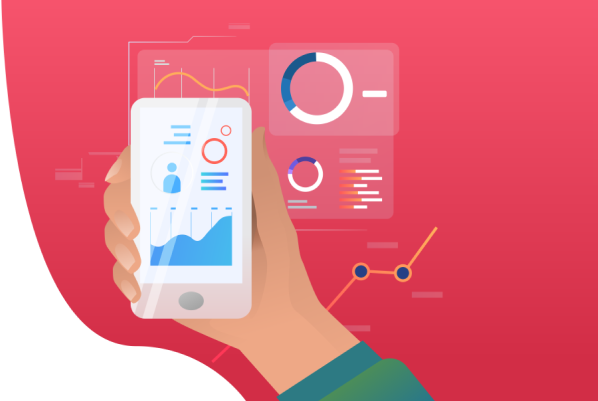
A pancreatitis diet is the need of the hour for those who have this inflammatory pancreatic condition, with symptoms ranging from abdominal pain to the inability to digest food. You can follow a low-carb diet for pancreatitis by limiting carbs. Consume low-fat foods to prevent the inflammation from aggravating. Also, increase your intake of medium-chain triglycerides (coconut, yogurt, milk) as they do not require pancreatic enzymes to be broken down. Keep away from high-sugar foods, carbonated drinks, high-fat, high-fiber, and high-sodium foods, and junk items to avoid straining your digestive system more. A high-protein diet for pancreatitis may also be recommended for some individuals. You may have to take certain supplements (for enzymes, minerals, and vitamins) after consulting a medical professional.
Frequently Asked Questions
Will I be able to do normal activities?
That depends on your condition. If your doctor recommends rest, you must avoid doing strenuous activities. You may do isometric exercises and stretching.
Will I be able to consume alcohol after my recovery?
No. It is not recommended to consume alcohol after pancreatitis healing. It will only aggravate the condition and make you prone to another flare up.
Will smoking impact my disease?
Yes, it will. Hence, it is better to quit smoking.
Is pasta good for pancreatitis?
Yes, eating whole-grain pasta, bread, and cereals is good for pancreatitis as they are rich in fiber.
How long does pancreatitis take to heal?
Most people with acute pancreatitis improve within a week and leave the hospital within 5-10 days. They usually recover in a month with proper rest.
Is broccoli good for pancreatitis?
Yes, cruciferous vegetables like broccoli, cauliflower, cabbage, and sprouts are rich in indole-3-carbinol and vitamins C and E, which are great for the pancreas and help in easing abdominal pain (8). These are also considered as pancreatitis superfoods.
Key Takeaways
- Excess alcohol consumption, smoking, or genetics may cause pancreatitis.
- Dehydration, drastic weight loss, and diarrhea are a few symptoms of pancreatitis.
- Strictly avoid fatty, dairy, and high-fiber food and take small and frequent meals throughout the day
- Add lean proteins, low-fat dairy products, whole grains, and fruits to help manage pancreatitis.
- Your doctor may recommend pain medications or pancreas surgery to help remove excess fluids from the pancreas.
Discover some simple diet tips to help maintain a healthy pancreas. Watch this video to get some advice on what to eat and how to stay healthy.
Personal Experience: Source
i. Getting used to eating for my Pancreas
https://flourlesssugarlessguiltless.wordpress.com/2013/04/15/getting-used-to-eating-for-my-pancreas/





